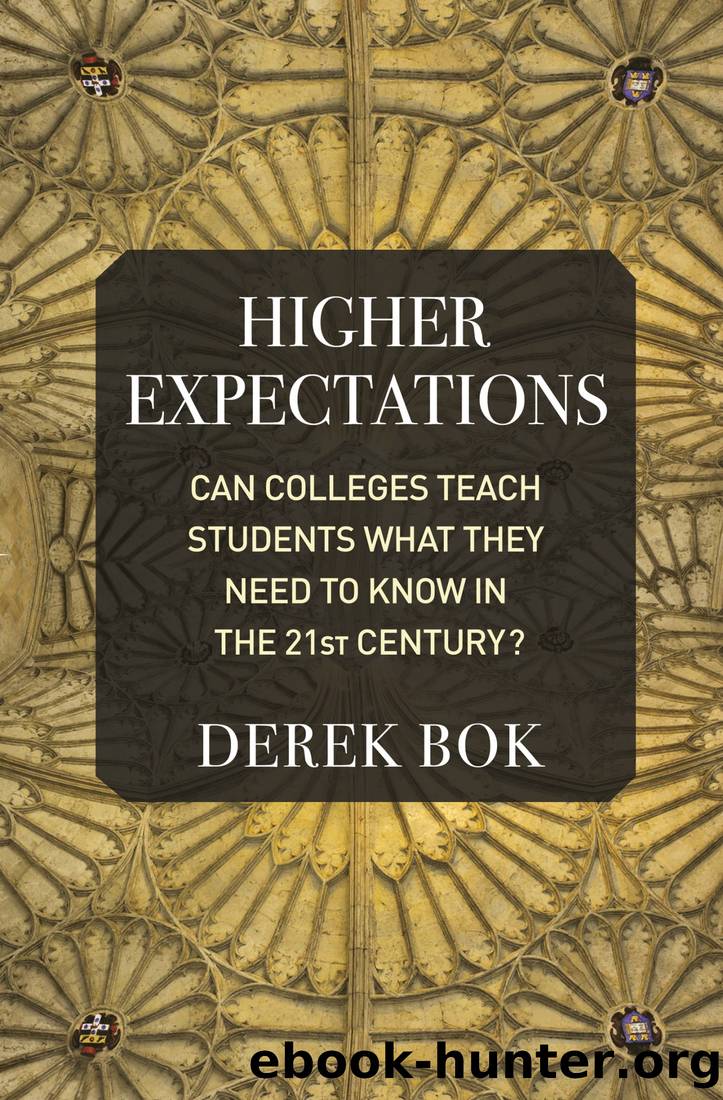Higher Expectations by Derek Bok

Author:Derek Bok [Bok, Derek]
Language: eng
Format: epub
Published: 2020-06-23T00:00:00+00:00
LIFELONG LEARNING
There is much talk in educational circles today about the importance of âlifelong learning,â or what some researchers refer to as âa continuing desire to engage in effortful cognitive activity.â13 The latter definition makes clear that this quality of mind encompasses both the motivation and the ability to keep on learning new things.
What accounts for the growing interest in lifelong learning? Part of the reason, surely, is the pervasive sense that technology is forcing employees in many companies to make more frequent changes in their knowledge and skills in order to remain effective. In addition, as lifetime employment in the same institution has become increasingly rare, young people today must expect to change jobs and learn new skills more frequently than their parents and grandparents did. Outside the workplace, technological change requires consumers to learn to use a succession of new and complicated products such as computers, smartphones, and the like. Understanding income tax requirements, choosing the most appropriate health-care plan, and many other familiar adult tasks also seem to have become more complex, forcing users to exert greater intellectual effort to respond effectively. Finally, the average life expectancy has increased dramatically over the past century, so that young people today must anticipate many additional years in which they can enliven their retirement by exploring new subjects and pursuing new intellectual interests.
A few investigators have studied the continuing desire to learn, or what such scholars call the âneed for cognitionâ (NFC). They generally agree that NFC is a disposition that is capable of being nurtured and enhanced.14 It is connected to one of the âBig Fiveâ personality traits, âopennessâ to new experiences and ideas, which in turn is partly genetic but partly capable of change during early adulthood. According to some researchers, NFC is a quality of mind that can be developed in college students regardless of characteristics such as their parentsâ level of education or their high school grade point average.15
Although educators often talk about kindling a desire for lifelong learning, there is little settled knowledge of how to do so. Students seem to acquire an appetite of this kind simply by going to college. According to the latest massive volume reviewing a decade of research about the effects of undergraduate education: âCollege attendance appear[s] not only to increase the capacity for life-long learning but it also crystallize[s] the predisposition to engage in life-long learning and intellectual development with a greater inclination to seek out learning opportunities.â16 This conclusion is supported by findings that college graduates are much more likely than adults with only a high school education to attend cultural events, borrow books from public libraries, and enroll in massive open online courses (MOOCs) on a variety of challenging subjects.
Few studies contain reliable evidence of specific policies and practices in colleges that help to develop a continuing need for cognition. As two authors recently observed, âThe need for cognition has been traditionally studied as a stable enduring dispositional characteristic and as such, has been treated as an explanatory variable rather than as an outcome itself.
Download
This site does not store any files on its server. We only index and link to content provided by other sites. Please contact the content providers to delete copyright contents if any and email us, we'll remove relevant links or contents immediately.
It's Never Too Late by Kathie Lee Gifford(628)
The 9.9 Percent by Matthew Stewart(601)
Hebrews, James by George H. Guthrie & George H. Guthrie(584)
Take Back Your Time by Christy Wright(584)
Israel: Ancient Kingdom or Late Invention? by Daniel I. Block(557)
The New Oxford Annotated Bible with Apocrypha by unknow(556)
The Book Every Leader Needs to Read by 48 Authors(553)
Eating the Bible by Rena Rossner(544)
Insights on Hebrews by Charles R. Swindoll(539)
Psalms, Proverbs, Ecclesiastes, and Song of Songs by John W. Hilber & Tremper Longman III & Duane Garrett(524)
The Jew in the Lotus by Rodger Kamenetz(483)
Commentary on the Torah by Richard Elliott Friedman(473)
Judges: Volume Two by unknow(471)
Who Wrote the Bible? by Richard Elliott Friedman(461)
NKJV, Ignite, eBook by Thomas Nelson(440)
Job, Ecclesiastes, Song of Songs by August H. Konkel & Tremper Longman III(436)
Proverbs, Ecclesiastes, Song of Solomon (Ancient Christian Commentary on Scripture) by J. Robert Wright(435)
Commentary on James (Commentary on the New Testament Book #16) by Robert H. Gundry(435)
Reading the Bible with Rabbi Jesus by Tverberg Lois(411)
